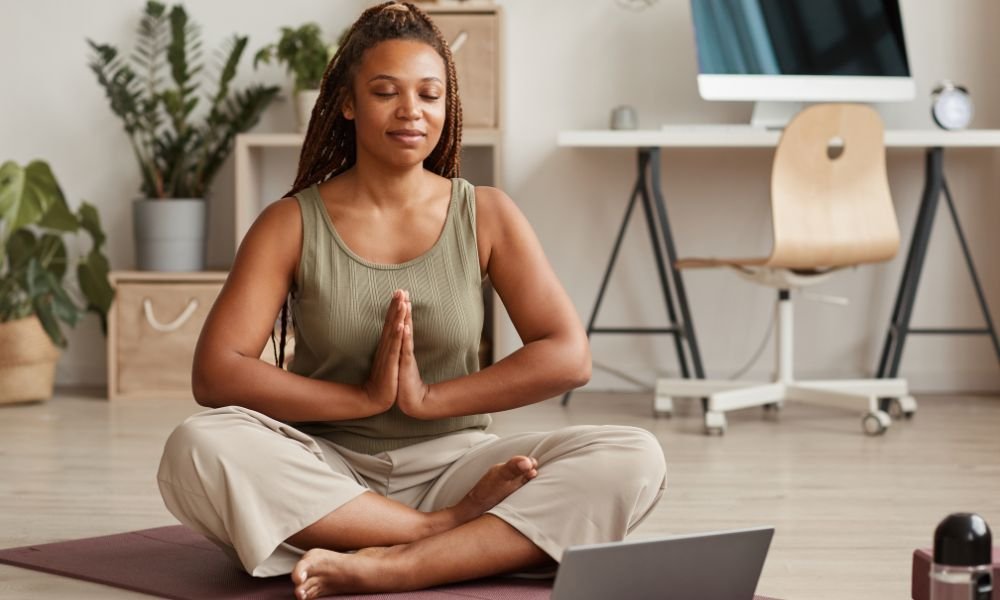How Meditation can Benefit your Business
Wouldn’t you know it, the very things that make running a small business desirable – lots more freedom, independence, creativity, and control—are the same things that can make it so challenging.
You have freedom, but that means you organize, schedule, and follow up on everything yourself—managing millions of details.
You have independence and more control, which can mean you are isolated, often thinking in a vacuum where perspective can get lost.
And yes, you have more opportunities for creativity, but after all the practical work of running a business—proposals, scheduling, financials, tech issues, marketing, follow-up, customer support, etc—sometimes finding that creative flow can be really difficult.
One of the first things you realize when running a small company is that you need to find the right balance for yourself. And the key word here is BALANCE. One of my yoga teachers once wisely said: Balance is not an end result – it is a process – we are constantly moving closer to or further from balance, but it is not ever attainable – it is a practice.
The Practice of Balancing Business and Creativity
As entrepreneurs, balancing our business side with our creative side is crucial. Even with a busy schedule and long hours, we still need to be able to access our creative energy and flow, whether designing a logo, writing a script, creating a new product, menu, workshop, etc. That is where meditation comes in.
Why Meditation? It Might Surprise You.
Meditation allows us to calm our racing minds and let our natural creativity flow. With all the tasks we need to accomplish in a day, it makes sense that our minds are in hyper mode, working in narrow perspectives to complete specific tasks. Although that is a massive help for completing tasks on our to-do list, it can deprive us of the creativity and openness that is so valuable in our work.
Obviously, meditation is not new. With a long tradition in Eastern culture, it continues to grow in popularity here in the West thanks to teachers and advocates like Jack Kornfield, Sharon Salzberg, and Deepak Chopra, to name a few. Since the United States seems to have a significant stress issue, meditation has gained popularity as a tool to help manage stress, enhance the quality of sleep, improve mood, and even support digestion.
Meditation is Good for Business
What is intriguing is to see meditation moving into the world of business. And really, why not? Studies have shown meditation improves clarity, decision-making, emotional intelligence, managing high-pressure situations, and creativity. Goldman Sachs, Apple, Proctor & Gamble, and Google are just a few of the companies that have incorporated meditation into their workday. I applaud these companies for providing meditation—however, they are not only supporting their employees’ wellbeing, they are demonstrating business savvy. They know mediation will help their employees be more productive, creative, and open-minded. Meditation is good for business.
Meditation and Your Brain
In recent studies, meditation has been seen to have statistically significant improvements for divergent thinking tasks that are used for quantifying creativity. A simple 30-minute meditation session has increased scores on those tasks over seven days (BioMed). One study cited in the Harvard Business Review found that meditation also helped increase mental adaptability overall. Participants had an easier time understanding new ideas, their function, and applying them to what they already knew. Overcoming obstacles and setbacks also became easier, as a stronger sense of courage and determination was observed (HBR). I don’t know about you, but that sounds good to me!
A Meditation Practice
These benefits are ideal for small business owners and solopreneurs. Plus, a meditation practice can help lower negative feelings like restlessness, anxiety, and nervousness.
So, how long should you meditate for? Well, according to several studies, 20 minutes of meditation a day for 45-60 days can have measurable effects on the brain. However, there is evidence that even 10-15 minutes a day can help, and it is a great way to become used to the practice and start to build. The most important thing is consistency. I do my yoga in the morning, followed by a 10-30 minute meditation, depending on my day. Don’t judge or beat yourself up about it— just commit what you can and think of it as an experiment. After a month, do you feel different? Do you notice anything shifting?
With all its benefits, meditation seems almost too good to be true—but then why is it so hard for so many of us to commit to a practice? I think we are all overstimulated these days and don’t prioritize taking time to simply be, to let our minds truly relax. Meditating allows our minds to exist purely in a state of awareness and not conform to any judgment or agenda.
When I first started meditating, I was frustrated. I kept thinking about the things I needed to do or a conversation that didn’t go well. I felt like a failure. Luckily, I was at Kripalu Center at the time, where wonderful teachers provided insight and support. It turns out you really can’t stop your thoughts, especially when you are first meditating. The idea is to catch yourself thinking and gently acknowledge “I am thinking,” and let it go and return to your breath or mantra. No judgment, no drama. One teacher said to think of your thoughts as clouds floating in the sky; you observe them but are not attached to them. Let them move on.
How to Start Meditating
For those of you who would like to get started or give it another try, below are some suggestions and resources I hope are helpful. Namaste!
Mindfulness Meditation
I found this the easiest when I was starting. Find a quiet spot to sit or lie down, close your eyes, and try to focus only on what comes to your senses. What do you hear? What do you smell? Try to be fully aware of what’s happening around you. Mindfulness is the idea of being nonjudgmentally aware of everything that comes to your senses. Let whatever stimuli come, notice it, and let it go. Take a few deep, slow breaths to center yourself at the beginning.
Guided Meditation
Meditation has become so much more accessible recently. Multiple online apps can guide you through different meditation and breathing techniques as you start your journey.
Some apps I like are Chopra and Calm, but there are many others.
Walking Meditation
I design websites and marketing plans, so I sit at my desk looking at a screen most of the day. Some days, the last thing I want to do is sit down to meditate. I find walking meditation or a slow yoga flow very helpful for slowing down my mind and connecting to my intuition – something about the flow of my body and energy after hours of sitting is luxurious for me.
When walking, I observe my thoughts, but I try not to let them pull me in. I don’t problem-solve or even think of creative ideas. I observe the trees, listen to the birds, feel the breeze, and follow my breath. If thoughts creep in, I notice them, wish them well, and let them go. It is not always easy, but I try, and that is what it is about – the practice.
Retreats
Another great way to start if you have the budget is to take a weekend workshop at a reputable center. There are many, from the very basic to the luxurious. Some of the ones I like include the Kripalu Center for Yoga and Health in Stockbridge, Massachusetts, Esalen Institute Big Sur, California, and The Art of Living Retreat Center, Boone, North Carolina. Your local yoga studio most likely has meditation classes as well.
Summary
The presence of mindfulness in our lives is something that’s sorely missed in today’s world. Taking time in your day to put yourself in a nonjudgmental, purely observational headspace can help center you and contribute to a better mental state. It’s so easy to be hypercritical as an entrepreneur. We feel as though everything needs to be perfect, as every step in new territory can seem like a big risk. That’s why it’s important to take that pressure off yourself and let yourself experience the world objectively. With a more open and relaxed mind, you may find new ideas and creative methods come much easier. There will still be difficult issues and clients, but you may find you can manage them with more calm, detachment, and clarity of thinking.
Research:
https://www.ncbi.nlm.nih.gov/pmc/articles/PMC7395604
https://hbr.org/2017/08/can-10-minutes-of-meditation-make-you-more-creative
https://behavioralandbrainfunctions.biomedcentral.com/articles/10.1186/1744-9081-10-9


